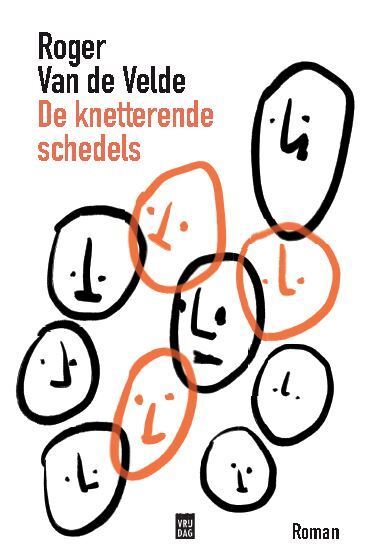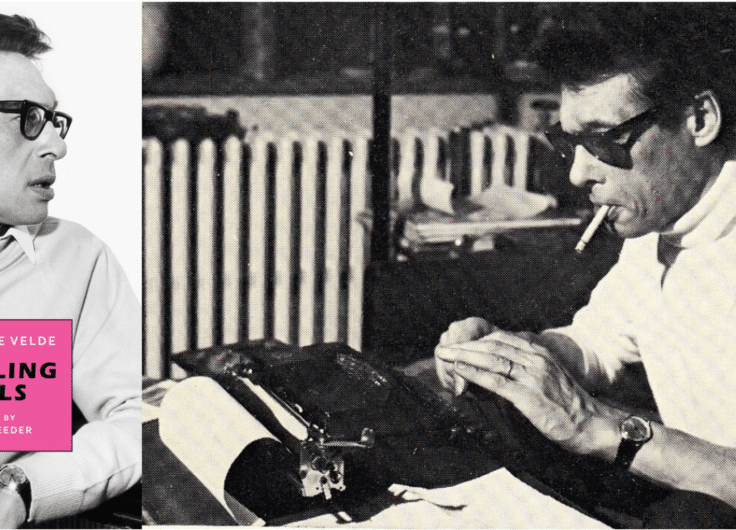The Instructions of Prometheus. A Short Story by Roger Van de Velde
Next year, the American publisher Snuggly Books will publish an English translation of De knetterende schedels
(Crackling Skulls), the collection of short stories by the ‘maverick of Flemish literature’ Roger Van de Velde, known for his stories written while he was interred in psychiatric institutions. The American-born Jonathan Reeder, based in Amsterdam, will translate Van de Velde’s book, from which you can read the short story The Instructions of Prometheus here for the first time in English.
The Instructions of Prometheus
Daniel smoked only three, at most four days a month, but then he smoked like a chimney from morning till night, let’s say non-stop, the longest cigarettes I have ever laid eyes on.
The first week of every month he invariably placed the same order at the canteen: seven pouches of ‘Louis Doize extra légères, sans filtre’ and three packets of ‘Riz-la-Croix automatique gommé’ rolling papers.
He used the papers to roll triple-length cigarettes, which he meticulously stored in a flat, red-lacquered paintbrush box emblazoned with a Chinese dragon, a cherished possession he carried with him at all times.
He smoked these improbably long cigarettes calmly and without the least ostentation. He sat alone at his usual spot at the table and exhaled, with quiet and earnest devotion, rhythmical blue puffs, like an imperturbable Arab silently sitting at his hookah while meditating on Allah’s unfathomable wisdom.
 Roger Van de Velde (1925-1970)
Roger Van de Velde (1925-1970)Nothing in Daniel’s ascetic expression betrayed even an iota of emotion or satisfaction while he smoked. Only his eyes took on an oily luster, like the trance of an epileptic when a seizure is coming on.
I often observed him from a distance. He appeared oblivious to any other presence in the overfull common room. Sometimes his measured, ritual gestures reminded one of the unhurried ceremony of a high priest who, in brocade robe and with beringed fingers, swings the censer while his thoughts waft upwards, along with the smoke, to loftier regions.
After breakfast a guard would give Daniel a light for his first cigarette. He did not have to ask. The guard, his acolyte, stood like a gangly choirboy in his white coat in the dining room doorway and automatically produced a box of matches from his pocket.
And so Daniel commenced his monthly smoking marathon lasting three, sometimes four days. He placed the paintbrush box holding his pre-rolled stockpile on the table before him like a miniature tabernacle and smoked his three-staged cigarettes without inhaling. With one yellowed fingertip he carefully flicked the ash into a tin soapdish next to the paintbrush box and used the stub to light the next one. I have never seen a more thorough demonstration of chain smoking. This perpetuum mobile was interrupted only for meals and sleep. After each requisite interlude, the guard would silently offer him a new light and Daniel would silently continue his marathon.
Equally essential to the ritual was the presence of old Roupcinsky. He remained unwaveringly at Daniel’s side for the duration of the smokefest. He sat next to him at the table, attentive and reverential, watching in rapt attention through the cloud of his cataracts and with a feverish blush on his cheeks while the extra-long cigarettes slowly burned, then pounced like a hawk on its prey when a stub was deposited in the soapdish.
Roupcinsky delighted in cigarette stubs. He far preferred a handful of stubs to an entire pack of fresh cigarettes ever since the warders forbade him to break whole cigarettes into pieces. The nicotine-drenched remains in the soapdish allowed Roupcinsky to chew lavishly for a week. He, too, always carried a tin box with him, for the stubs. Queen Fabiola’s image smiled from the lid, but Roupcinsky’s banged-up tin was less attractive and more profane than Daniel’s red-lacquered paintbrush box with the clawing Chinese dragon.
Daniel was in the habit of taking an early afternoon stroll around the flowerbeds of the courtyard. He walked stiffly, lifting his rheumatic knees too high. To see him walking there with his long cigarette reminded one of a quivering heron with a scrap of white driftwood in its beak. Roupcinsky stuck to him like a suckerfish and, leering and chewing, plucked the smoldering butts from amidst the dahlias and poppies as though they were glowworms.
Daniel’s periodic smoke-mania was made possible by a providential sum of one hundred fifty francs, which was deposited by postal order in his name with calendric punctuality on the first of every month. The maecenas was one Baroness Hélène Boxtyns de Lichtendaal. The stipend had been coming in for years, and no one in the asylum was able to trace the origins or nature of this mysterious relationship.
Daniel never spoke of the baroness. He signed the postal order in elegant, aristocratic handwriting without further comment, as though this payment was his rightful due. Then he promptly placed his order with the canteen, puffed down his supply in three days, and did not touch a single cigarette for the rest of the month.
For Roupcinsky, the first week of the month was a treat. The brown juice continuously dribbled down his chin. For the next three weeks he paid Daniel no notice, but he impatiently counted the days until the first of the month, when he would again station himself and his Fabiola tin at Daniel’s side, gloating with pleasure.
In vain I wondered why Daniel would go through his supply of cigarettes in a few days, and after that seem to suffer no craving whatsoever. It couldn’t have been the nicotine buzz, for whenever I offered him a cigarette, he always refused it haughtily, almost with contempt. Maybe he would smoke no other brand, I thought. So in the third week of the month I bought a pouch of Louis Doize and a packet of Rix-la-Croix in the canteen. But when I, quasi-nonchalantly, tried to slip it to him, he gave me such a harrowing look that I hid away the unwelcome gift at once, as though it were something obscene.
 First edition of 'De knetterende schedels', published in 1969
First edition of 'De knetterende schedels', published in 1969And yet I was not to be deterred. My constantly rekindled, insatiable curiosity was determined to find out why he would obsessively smoke such long cigarettes and then suddenly stop.
‘Daniel,’ I asked one day when he appeared well-disposed, ‘why do you smoke such long cigarettes?’
He looked at me with the eyes of a lizard. Every time he looked at me this way, it felt like a flock of startled pigeons flapped past above my head.
‘I am following the instructions of Prometheus,’ he whispered.
‘Who is Prometheus?’ I asked.
‘Prometheus is a spy,’ he replied, pausing for a moment to let his words sink in. ‘But it’s a secret between you and me,’ he added conspiratorially. ‘You mustn’t tell anyone.’
I promised I would not, but my further efforts to get to the bottom of the enigma went nowhere. Was he familiar with the story of Prometheus and his hollow reed? He must have heard or read somewhere that the myth had something to do with fire. But what role the Baroness Hélène Boxtyns de Lichtendaal played in the affair remained a mystery. He did not utter a word about her, and I dared not press him for fear of driving him yet further into his shell.
Did the baroness in one way or another suspect that the secret, thanks to the inquisitiveness of a brazen outsider, had been breached? Ach… I’m just telling myself fairy tales.
But the fact of the matter is: on the first day of the following month no postal order arrived, nor the first of the month after that. The mysterious source of funds appeared to have suddenly run dry.
Daniel sank, day by day, into an ever more somber mood, and I feared that a crisis was imminent—the way the corners of his mouth trembled was the writing on the wall.
The crisis did not come, but at times he sat across from me at the table, his empty paintbrush box in front of him, glowering at me so blackly, so hatefully that it gave me the shivers. It was pure coincidence, naturally, but I felt ill at ease and a bit guilty for having stuck my nose into his secret bond with Prometheus.
After six weeks I could stand it no longer. I bought three pouches of Louis Doize and two packets of Riz-la-Croix, rolled a dozen extra-long cigarettes, and deposited them without a word on the table next to the paintbrush box.
 2020 edition of 'De knetterende schedels', published by Uitgeverij Vrijdag
2020 edition of 'De knetterende schedels', published by Uitgeverij VrijdagAnd then came Daniel’s crisis. He let out an earsplitting shriek, ran through the common room on his spindly legs, disappeared into the cupboard behind the kitchen, and drank a quarter of a bottle of Eau de Javel before the guard could intervene.
He was rushed to the hospital, his insides on fire and a greenish froth on his lips.
Fortunately, the damage from the bleach was minimal. Leonard, who lay in the same hospital with prostate troubles, wrote just a week later that Daniel had recovered quickly and gorged himself on oranges, which was surely a good sign.
One of the guards informed me shortly thereafter that Daniel, thanks to intervention by his family, would be transferred to another asylum. Was it on the instruction of Baroness Boxtyns de Lichtendaal? I never found out.
After that, I saved my cigarette stubs in a cardboard box for Roupcinsky.




